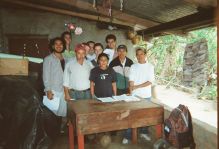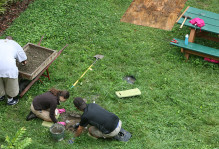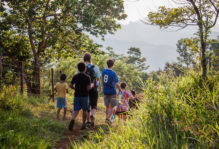Newbies step up
The MANOS students had reason for concerns about language proficiency and depth for the annual project trip. Two of our most talented and experienced teammates would not make the trip. Lester Chavez ’14 (8 trips) and Kristina Ripley ’15 (2 trips), both native Spanish speakers and both deeply knowledgeable about our research, methods, and theory, were missed for their talents — and for their companionship. MANOS students with “advanced” speaking abilities were asked to step up and to step into more active roles in focus group interviews and community meetings. Johnathan (“J$”) Maza ’15 (5 trips) and Kristin Giordano ’14 (5 trips), in particular, assumed lead speaking roles and made especially significant contributions to team efforts. Chrissy Sherman ’14 (8 trips), Brooke (aka “Bruce”) Huffman ’15 (4 trips), Roni Nagle ’15 (4 trips), Tommy (“Mad Dog”) Northrup ’16 (3 trips), Ambika Babbar ’14 (3 trips), Steph (aka “Baywatch”) Wraith ’15 (4 trips), Emily Mahoney ’15 (2 trips), and Zander (aka “TZ”) Pelligrino ’15 (4 trips) pushed themselves to engage more actively as speakers and translators, and the result was that we had more language abilities in play than in any previous project work. (My opinion; my teammates past and present may or may not agree.) And, our newest team members, especially Quetzabel (“Q”) Benavides ’16 (2nd trip), Michelle Betancourt ’17 (1), both native Spanish speakers, moved seamlessly into very demanding roles in both interviewing and facilitating community meetings. Sarah (aka “SB”) Martin ’17 (1 trip) and “Quesa” Diya Uthappa ’17 (1) waded into the mix to provide both sound note-taking (in Spanish) and comments and questions in the course of meetings and interviews. In all, it was a very strong showing.
J$ Maza struggled against his comfort zone to meet team needs for communications — not just proficient Spanish but engaged, deliberative, inviting exchange that brought participants fully into important and consequential conversations. Reminiscent of James Bond’s provisioner, our very own “Q” was a marvel of invention and innovation, particularly adept with the turn of phrase and metaphor — and remarkably steady in facilitating the participation and inclusion of Chaguite residents.
What to say of this intrepid, rowdy bunch of public health and participatory development research wonks? They are not easily discouraged; they don’t whine; they bend to the work at hand; they rise above the challenges; and they stay focused on systematic knowledge and respectful partnering to promote change. There was not much drama in this year’s work. Given the challenges of logistics, the demands of the work, the difficulty of living with 18 or so other people 24-hours per day, and the complexity of the issues we attempt to understand and manage, that says a hell of a lot! Somehow, Baywatch and her assembly of collaborators managed to set up and operate daily clinics in multiple locations, only one of which is intended for use as a medical clinic. The daily setup and striking, by all accounts, were seamless. FOMO Sherman was everywhere, responding to the needs of the work even before the rest of us knew that there were needs. Kristin Giordano proved herself again to be a “thoughtful watcher,” keenly aware of details in exchanges, unfailing in her attention to human and cultural matters — even as she took on significant responsibilities as a lead speaker. We have been fortunate throughout the project to have at least one team member whose deep concerns for respectful partnering, whose cultural awareness and sensitivity shine a bright light on what we say and do as guests in another country and community. Kristin has been superb in this role.
As always, there is more to say: “Dog bites man.” “Mountain bruises car.” “Earthquake compounds travel difficulties.” These might have been (and still might be) headlines for blog posts. The countless contributions of every member of the team deserve to be spotlighted, but fortunately for all of us, we don’t do this for recognition. The satisfaction comes from learning and from careful, methodical efforts to test the value of what we learn in advancing authentic partnerships for change.




No comments.
Comments are currently closed. Comments are closed on all posts older than one year, and for those in our archive.